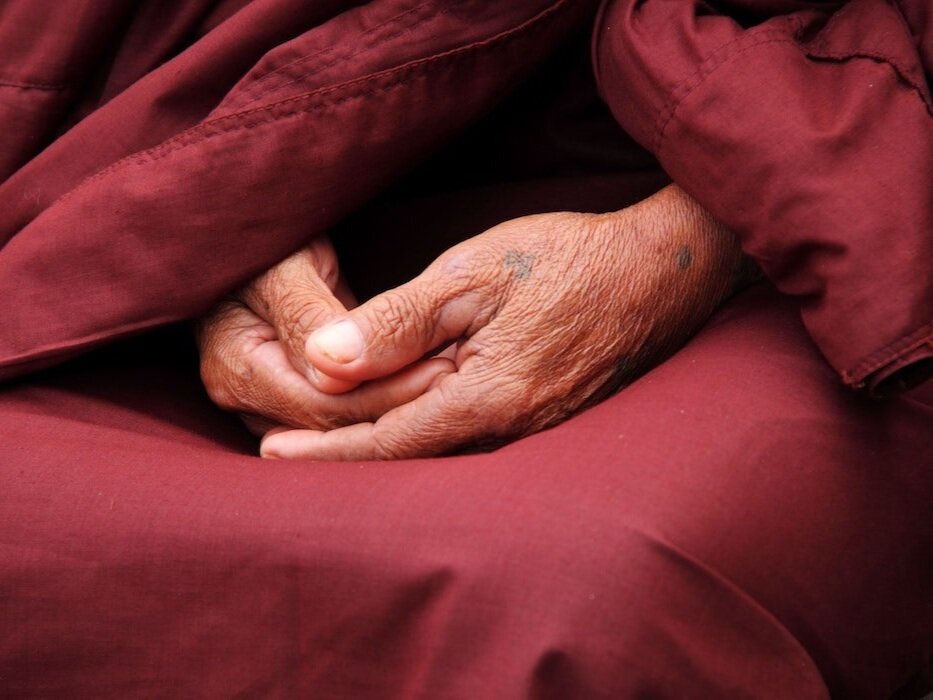What's Really So Scary About The Coronavirus?
Can you open to the idea that every experience you have in life is here to teach you something? This isn’t the same as saying that everything happens for a reason, that every tragedy was “meant to happen.” But it is to acknowledge simply one undeniable truth: most of life is outside of our control.
This has been true all of our lives, and it’s in poignant moments, such as a natural disaster, a near-death experience, or, say, a global pandemic--that one must confront this deeply uncomfortable reality.
The best that we can do is to change the way we’re relating to what’s happening. I’ve struggled with being emotionally reactive in many ways in my life, which is what brought me to the practice of meditation when I moved to Thailand in 2010. These past several weeks have been a fascinating case study in human psychology, thanks to this global pandemic. It’s been interesting to watch the reactivity in my own mind, as well as the ways in which others have been reacting to the rapid spread of the coronavirus.
From February 1st to March 13th, I sat a silent meditation retreat north of San Francisco, at an ideal place to learn and practice insight meditation in the Theravada Buddhist tradition: Spirit Rock. That retreat came to an abrupt end thanks to the coronavirus, especially for those of us who lived overseas and feared that we might not be able to return home if we didn’t leave soon.
In the first few days following that retreat, the situation triggered strong feelings that many of us have felt over these past few weeks: uncertainty, fear, anxiety, neuroticism. Despite having a fairly stable degree of concentration from which to gain insight into my old habits, the power of these emotions disrupted that stability. It wasn’t as strong as panic, but there is a kind of intense focus that gets activated when the “fight or flight” mode of being gets switched on.
As the days passed my concentration started to stabilize and my ability to see clearly into my own patterns brought insight into deeply conditioned patterns of thinking: what makes me feel safe, how do I respond when I feel threatened, what pulls me into a trance of unconsciously believing these stories of fear and anxiety and neuroticism.
Witnessing the reactions of others has served as a mirror, allowing me to see very clearly those reactive patterns that I wish to let go of. Conversely, seeing the calm, compassion and equipoise displayed by many people has positively reinforced how I do want to respond under such challenging circumstances.
Fundamentally, what’s so scary about the coronavirus is that it viscerally reminds us of aspects of the human condition that we wish to avoid.
Life is fundamentally uncertain, as everything is always changing. We can do things to make life more certain and predictable and we do these things for a number of reasons, most fundamentally the fact that they make our ego structures feel safe. On a macro level, we certainly want stable, organized and efficient societies and institutions. Within our own minds we can see these same impulses operating as we attempt to navigate the ups and downs of our lives, to make meaning out of the world and our place within it, to construct a sense of self. This is in fact how our minds are designed to work: they make order out of chaos.
Human beings find change so difficult even though we know in our more honest moments that this is simply the way things are. But we don’t want to accept this: we want comfort, security, safety not the disruption of change.
We can observe this truth of impermanence happening all around us, but we still don’t see ourselves as part of this process: this undeniable fact that we’re going to die. We tell ourselves intellectually we know that we’re going to die. But we don’t really accept this fact. We don’t internalize it. We don’t allow the truth of it to reorient our lives in a way that could be incredibly, powerfully, life-changing for ourselves and for the lives of others.
If we allow ourselves to acknowledge the reality of our own mortality we can access a higher place of wisdom: we not only know that we’re going to die, but we also know that it’s really not our choice when we’re going to die or how we’re going to die. Yet we spend so much of our lives trying to resist this fact and this sense of trying to control what’s uncontrollable causes so much suffering.
I watched a Real Time with Bill Maher segment on YouTube in which the panel discussed the fact that the fatalities associated with COVID-19 primarily impacted older people, and even for those older at-risk people the odds were still one out of six. Bill joked that those aren’t bad odds. Clearly, he was only half-joking.
One person commented in the thread that “I’m 76 years old, and I’m not ready to die.” My heart went out to him. I could feel the pain and fear in his voice. I also wondered: “when will you be ready to die? At 86? How about 96?”
The truth is that most people are not ready or willing to let go at any age. When is your time? You don’t know. It’s when life decides that it’s your time--not a moment sooner, not a moment later.
You read about exceptions to how people respond to death: people who live to 100 and have no friends left and their personal health has left them with not much to live for, people who have a terminal illness and are in so much suffering they just want it to end, and of course, these rare individuals who just beautifully and gracefully say “you know what, I’d love to live longer but I’ve had a great life and I’m grateful for it.” What a gift these people are to the lucky souls who get to meet them in their final days.
At this very moment, there are young children dying of cancer. I’m sure they’re not ready to die; their parents certainly aren’t, and these children definitely don’t deserve to die. Who does deserve it? On a regular basis, even in the wealthiest of countries, how many people are starving to death, or dying from preventable diseases, or from violent crime?
The coronavirus pandemic is psychologically affecting many of us who are used to being able to insulate ourselves from these kinds of perceived threats. It’s disturbing the cocoon of comfort in which we’ve very carefully ensconced ourselves.
When I was 29, my dad, who was 71, died suddenly in a car accident. It would have been wonderful to say goodbye. It had nothing whatsoever to do with whether I was ready to say goodbye or not. It simply happened. There’s the intense grief of losing a loved one. That’s one layer of emotional pain. But then we add another layer on top: resistance to our unpleasant experience. That second layer is the suffering we impose on ourselves by resisting rather than opening to life as it is: beyond our ideas of good and bad, right and wrong, fair and unfair.
We could all go on and on about how life would be better if things were different than they are.
Life has a knack for reminding us that reality does not exist to conform to our preferences, despite our best efforts. We can get away with some success of controlling for outcomes for a period of time, but then life will eventually remind us that making our happiness contingent upon having outcomes conform to our preferences is simply a poor strategy for well being.
What happens when we pause, notice that we’re still breathing, and say with a tone of self-acceptance to ourselves: “this is simply how things are right now.”
This is part of the package we have to accept with being human: like all other beings, we’re born, we’re here for a relatively short time, then we pass away. Everything arises, everything passes away.
Humans have both the unique blessing and the unique curse that is human consciousness: we get to be aware of our own mortality and we have to grapple with it. This is what art and culture help us to do: to create beauty in the face of tragedy, to make meaning out of a sense of meaninglessness.
When someone asks what was the cause of death there are many reasons: heart attack, car accidents, cancer and, now, coronavirus joins the long list. These are the most proximate causes to death but we never mention the real cause of death: birth. The common cause of every death is birth.
The moment you’re born, you’re given a guarantee that you’re going to die. In a modern society that is increasingly concerned with the material plane, we don’t like to hear this reminder. In particular, Western societies do everything they can to disguise this obvious fact. We surround ourselves with images of youth and beauty; we stick old people into old people’s homes because we can’t stand the reminder that this one day will be us if we’re lucky.
I think all of us can acknowledge that we want to live a long, healthy and happy life. I’m very into health and longevity. I’m a big fan of discipline and routines and trying to design my life for optimal outcomes. But I also temper these impulses towards order by reminding myself of the inevitably of chaos. Just as things come together, so they fall apart. Just as things are born, so too must they pass away. This is the dance of the universe and it is both beautiful and tragic to be a part of it, from the perspective of human consciousness.
In order to live more fully, I’m opening to this moment as an opportunity to come into clearer relationship with the truth of my own mortality. I’m trying to die to the ignorance and fears that are holding me back so that what wishes to come and forth and express itself can do so with more clarity and vividness and joy.
The real question to contemplate isn’t “when am I going to die?” or “how am I going to die,” which are futile questions for you to consider. The real question is: “how do I want to live?”
If you were to come to terms with your own mortality how might that empower you to start living the life that you want to live more fully? If you were to simply start noticing “what’s outside of my control?” and “what’s within my control?” how might that change how you’re responding to what’s happening around you, at this very moment?




